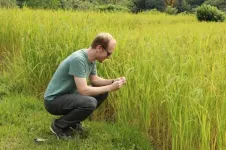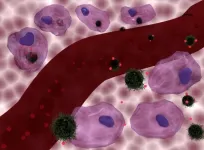(Press-News.org) As the world grows increasingly globalized, one of the ways that countries have come to rely on one another is through a more intricate and interconnected food supply chain. Food produced in one country is often consumed in another country -- with technological advances allowing food to be shipped between countries that are increasingly distant from one another.
This interconnectedness has its benefits. For instance, if the United States imports food from multiple countries and one of those countries abruptly stops exporting food to the United States, there are still other countries that can be relied on to supply food. But, as the coronavirus COVID-19 global pandemic has made abundantly clear, it also leaves the food supply chain -- all the steps involved in bringing food from farms to people's tables across the world -- exposed to potential shocks to the system.
A new study published in Nature Food led by the University of Delaware's Kyle Davis looked at how to ensure that food supply chains are still able to function under these types of environmental shocks and highlighted key areas where future research should be focused. Co-authors on the study include Shauna Downs, assistant professor at Rutgers University's School of Public Health, and Jessica A. Gephart, assistant professor in the Department of Environmental Science at American University.
Davis said the motivation behind the paper was to understand current knowledge on environmental disruptions in food supply chains and to investigate evidence that disruptions in one step of the food supply chain impact subsequent stages. The steps on the global food supply chain are described in the paper as food production, storage, processing, distribution and trade, retail and consumption.
"Does a disruption in food production get passed through different steps and ultimately impact distribution and trade, all the way down to the consumers?" asked Davis, assistant professor in the Department of Geography and Spatial Sciences in UD's College of Earth, Ocean and Environment and the Department of Plant and Soil Sciences in UD's College of Agriculture and Natural Resources who is also a resident faculty member with UD's Data Science Institute. "If there's a shock to agriculture on the other side of the world, will you see the effects in your grocery store?"
The environmental disruptions covered in the paper include events like floods, droughts, and extreme heat, as well as other phenomena like natural hazards, pests, disease, algal blooms, and coral bleaching.
Davis said that this work is especially timely -- given the unprecedented effects that the COVID-19 pandemic has had on the entire food supply chain -- and highlights the importance of understanding how to make global food supply chains function properly under stress.
"COVID-19 has affected all steps in the supply chain simultaneously, from not having enough seasonal workers to harvest the crops to meat processing plants temporarily closing because workers get sick, to hoarding behaviors and runs on grocery stores," Davis said. "We've also seen many people losing their jobs, and as a result, they may not be able to purchase certain foods anymore."
Researchers have focused on understanding how temperature and precipitation affect staple crops at the production step in the supply chain, Davis said, but how that impacts the rest of the steps in the food supply chain has not been researched thoroughly. Because of this, we don't have a good grasp of how a suite of disruptions on a variety of food items ultimately impact consumption, food security, and nutrition.
To address these gaps in knowledge, the researchers identified key areas for future research: 1) to understand the shape of a supply chain, meaning its relative number of farmers, distributors, retailers and consumers to identify possible vulnerabilities; 2) to evaluate how simultaneous shocks -- such as droughts in two different places -- impact the whole supply chain; and 3) to quantify the ability for substitutions to occur within supply chains, like switching cornmeal for flour if there is a wheat shortage.
Ultimately, Davis said this work can help policy makers and businesses make food systems more capable of predicting and absorbing unprecedented shocks.
"As climate change and other sudden global events like pandemics exercise greater influence on food systems," Davis said, "we will need to continue building resilience into our food supply chain so that we're able to absorb a disruption that may be bigger than what we've seen in the past but still maintain the function of the supply chain -- getting food from field to fork."
INFORMATION:
SAN ANTONIO and CHICAGO - An article published Jan. 5 in Alzheimer's & Dementia: The Journal of the Alzheimer's Association cites decades of published scientific evidence to make a compelling case for SARS-CoV-2's expected long-term effects on the brain and nervous system.
Dementia researchers from The University of Texas Health Science Center at San Antonio (UT Health San Antonio) are the first and senior authors of the report and are joined by coauthors from the Alzheimer's Association and Nottingham and Leicester universities in England.
"Since the flu pandemic of 1917 and 1918, many of the flulike diseases have been associated with brain disorders," said lead author ...
DURHAM, N.C. -- Self-control, the ability to contain one's own thoughts, feelings and behaviors, and to work toward goals with a plan, is one of the personality traits that makes a child ready for school. And, it turns out, ready for life as well.
In a large study that has tracked a thousand people from birth through age 45 in New Zealand, researchers have determined that people who had higher levels of self-control as children were aging more slowly than their peers at age 45. Their bodies and brains were healthier and biologically younger.
In interviews, the higher self-control group also showed they may be better equipped to handle the health, financial and social challenges of later life as well. The researchers used structured interviews and credit checks ...
NEW YORK, NY (1/5/2021) - Subtle changes in speech and language can be an early warning sign of Alzheimer's -- sometimes appearing long before other more serious symptoms. The challenge is recognizing these changes and determining what may signal Alzheimer's or other neurodegenerative disorders. In a commentary in END ...
One sweaty, huffing, exercising person emits as many chemicals from their body as up to five sedentary people, according to a new University of Colorado Boulder study. And notably, those human emissions, including amino acids from sweat or acetone from breath, chemically combine with bleach cleaners to form new airborne chemicals with unknown impacts to indoor air quality.
"Humans are a large source of indoor emissions," said Zachary Finewax, CIRES research scientist and lead author of the new study out in the current edition of Indoor Air. "And chemicals in indoor air, whether from our bodies or cleaning products, don't just disappear, they linger and travel around spaces like gyms, reacting with other chemicals."
In 2018, the CU Boulder ...
Heating up cancer cells while targeting them with chemotherapy is a highly effective way of killing them, according to a new study led by UCL researchers.
The study, published in the Journal of Materials Chemistry B, found that "loading" a chemotherapy drug on to tiny magnetic particles that can heat up the cancer cells at the same time as delivering the drug to them was up to 34% more effective at destroying the cancer cells than the chemotherapy drug without added heat.
The magnetic iron oxide nanoparticles that carry the chemotherapy drug shed heat when exposed to an alternating magnetic field. This means that, once the nanoparticles have accumulated in the tumour area, an alternating magnetic field can be applied from outside the ...
Researchers in Japan have made the first observations of biological magnetoreception - live, unaltered cells responding to a magnetic field in real time. This discovery is a crucial step in understanding how animals from birds to butterflies navigate using Earth's magnetic field and addressing the question of whether weak electromagnetic fields in our environment might affect human health.
"The joyous thing about this research is to see that the relationship between the spins of two individual electrons can have a major effect on biology," said Professor Jonathan Woodward from the University of Tokyo, who conducted the research with doctoral ...
Two studies from the University of Copenhagen show that Danes aren't quite as good as Chinese at discerning bitter tastes. The research suggests that this is related to anatomical differences upon the tongues of Danish and Chinese people.
For several years, researchers have known that women are generally better than men at tasting bitter flavours. Now, research from the University of Copenhagen suggests that ethnicity may also play a role in how sensitive a person is to the bitter taste found in for example broccoli, Brussels sprouts and dark chocolate. By letting test subjects taste the bitter substance PROP, two studies demonstrate that Danish and Chinese people experience this basic taste differently. The reason seems to be related to an anatomical difference upon ...
A recent study by prof. Tone Bjørge, University of Bergen, and her team shows that thyroid cancer is related to in-utero exposures.
Thyroid cancer is diagnosed at a younger age than most other malignancies and the incidence is higher in women than men.
"The only established modifiable risk factors for thyroid cancer are childhood exposure to ionizing radiation and obesity. Few in-utero and early life risk factors have so far been identified" says Bjørge, professor at Department of Global Public Health and Primary Care, University of Bergen.
Maternal hypothyroidism, hyperthyroidism, goiter, and benign thyroid neoplasms ...
BEER-SHEVA, Israel...January 5, 2021 - Reopening Florida elementary and high schools in September was followed by increased COVID-19 infections, according to data analyzed by Ben-Gurion University of the Negev, Harvard Medical School and Tel Aviv University researchers.
The findings were just published in END ...
Researchers at Paderborn University have developed a new method of distance measurement for systems such as GPS, which achieves more precise results than ever before. Using quantum physics, the team led by Leibniz Prize winner Professor Christine Silberhorn has successfully overcome the so-called resolution limit, which causes the "noise" we may see in photos, for example. Their findings have just been published in the academic journal "Physical Review X Quantum" (PRX Quantum). In "Physics", the publisher's online magazine, the paper has also been highlighted with an expert Viewpoint - an honour which is given to only certain selected publications.
Physicist Dr Benjamin Brecht explains the problem of the resolution limit: "In laser distance measurements ...





